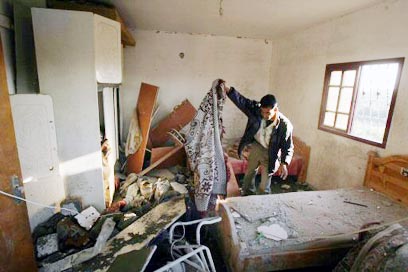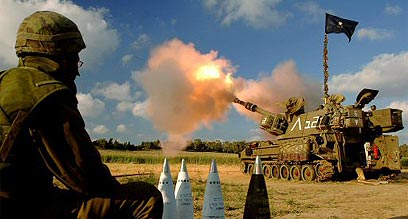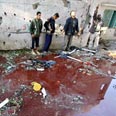Overall, 12 shells were fired – the sites hit by only two of them are not precisely known. Days will pass before the picture clears, and in the meantime we cannot discount the possibility that the disaster is a result of a "work accident" by Palestinian terrorists.
Yet these facts make almost no difference in the grave overall picture that is already becoming entrenched in Palestinian and world public opinion, which accuse the IDF of committing a massacre. This should not come as a surprise to anyone.
In the dozens of years the IDF has been dealing with rocket fire from Lebanon and Gaza, one thing has been proven beyond any doubt: Artillery fire (using cannons) is the least effective means in preventing rocket and mortar fire. On the other hand, it is most susceptible to end up hurting innocent civilians.
Moreover, preventative artillery bombardments that missed their targets entangled Israel in the international arena more than any other means employed by the IDF. On more than one occasion, they forced the State of Israel and the IDF – in the face of international pressure – to halt operations and actions that were essential in thwarting terrorism.

Damage in Beit Hanoun (Photo: AFP)
There's no point in listing all those cases. The list is long and grim. It is enough to recall the bombing of Qfar Qana, during the Grapes of Wrath operation in 1995, which left more than 100 innocent Lebanese civilians dead.
Following the incident, Israel was forced to halt its operations against Katyusha rocket launchers, accept Hizbullah's ceasefire terms, and explain its actions to a United Nation commission of inquiry. Another case involved the Gaza family killed on a beach several months ago.
Even though the incident was apparently not a direct result of an IDF bombardment, but rather, a Palestinian explosive device or a shell dud – international public opinion still accused Israel of barbarically killing innocent civilians.
The problem: Shells are inaccurate
The reason for the above is that artillery bombardment in proximity to residential areas, as accurate and careful as it may be and even employing large safety margins, will always be susceptible to errors.
Some of those errors are a result of the lack of eye contact, at the time of the firing, between the cannons and the target. Many other errors result from the shells' natural distribution.
Artillery is a weapon system designed to "cover" territory and not hit specific targets, particularly when it is used as "preventative fire" at territories rather than a specified target.
Another common reason for tragic incidents where innocents are hurt is errors in calculating the point of impact and technical failures in the armaments involved, which lead to the shells missing the target. Even shell duds that failed to explode threaten civilian populations no less than shells that were properly aimed and exploded.
Directly aimed tank fire is more accurate than artillery fire, but is also risky when employed in residential areas, because such fire is susceptible to missed shots and errors in identifying the target, particularly during nighttime.
These facts are well known to IDF officials, particularly after the recent Lebanon war where about 130,000 artillery shells were fired. Now it is clear that the effectiveness of this weapon against Hizbullah fighters was marginal, while the economic cost was astronomical and reached millions of dollars.
Even before the Lebanon war it was proven that artillery fire failed in preventing or even minimizing Qassam rocket fire from the Gaza Strip. This is the reason why the IDF Southern Command decided recently, on the recommendation of Gaza Division Commander Moshe "Chico" Tamir, to stop or at least highly limit the use of preventative artillery fire.
The trouble is that this recognition of the limits and risks associated with artillery fire were not implemented and so we got another horrifying testament to the dubious effectiveness and needless danger of hurting innocent civilians that is inherent in such fire near residential areas.
Israel will have to address the results of the disaster not only on the moral plain but also in terms of the damage to its position in the international arena. We must also recognize the fact that every such disaster boosts the motivation of Palestinian terror groups to continue the Qassam fire and terror attacks as well as the legitimization they receive on the Palestinian street.

IDF shelling (Photo: Reuters)
So why does the IDF still continue using artillery fire? It appears the answer stems from the frustration of IDF commanders after military operations considered successful do not curb or significantly reduce Qassam fire.
Such operations, like "Autumn Clouds" at Beit Hanoun and "Defensive Shield" in the West Bank in 2002 are supposed to create an intelligence infrastructure that would bring results in the long run. Yet meantime, the IDF and political echelons are slammed in the media and by residents of Sderot and Ashkelon.
The pressure exerted on commanders in the field as a result of the ongoing Qassam fire, and the frustration that stems from it, lead them to ignore professional considerations .
Experience shows that even if it ultimately turns out that the civilians killed in Beit Hanoun Wednesday were hurt by a "work accident" in a Hamas weapons warehouse in town, the Palestinians and international community will continue to blame Israel.
Therefore, the required conclusion is that the IDF must completely end preventative artillery fire. Foregoing this means would not fundamentally change the results of fighting Qassam fire, but at the same time will prevent severe physical and perceptional damages among innocent Palestinians and diplomatic damage to the State of Israel that will curb its ability to act against terrorist rocket fire.

















